EBR charges a service fee to manufacturers to produce ebike reviews and videos, this began in 2018. It’s the same flat fee for each bike, and it helps us to keep the site going while limiting ad clutter. We appreciate the opportunity to serve you with our opinions and data but respect your right to know that we receive compensation :)
Hi guys, this is Brent! The AddMotoR HITHOT H1 Sport is the first full suspension electric bike I’ve tested so far and it was also one of the most fun, even though it uses some cheaper parts. It’s clearly built for the trails, so I took it out with the goal of pushing it pretty hard. The front Suntour XCT suspension fork performed well for me on moderate terrain, and even though the rear coil suspension only has 22 mm of travel (which isn’t very much), I felt like it made a noticeable difference. Small jumps and bumpy trails were no problem, even for me, a rider who weighs 200 pounds. But, I’m not sure how well the HITHOT would hold up with serious downhill racing. The good news is, both the front and rear suspension have adjustable preload, so for those who want to push it even further, it’s possible to increase the stiffness of the shocks. The only downside to this suspension setup is the fact the motor is located in the rear, resulting in unsprung weight. Basically, this causes the rear suspension to have to work harder to accommodate the constant up and down motion of the rear tire and the additional weight of the hub motor (which weighs ~9 lbs), and over time this could cause more wear and tear on the rear spring as well as decrease its overall effectiveness, rough riding can also shake things up inside the motor, I have heard about magnets coming unglued on some other motors before. The tires are pretty standard Kendas, 27.5” x 3.2”, and they don’t appear to offer any puncture protection. So it might be a good idea to throw some Slime in there, or even swap the tubes tires out completely for something that offers a bit more protection against sharp rocks and thorns. Nothing’s worse than having to change a flat in the middle of nowhere, especially with a hub motor setup that doesn’t offer quick release and has additional wires to deal with. For those interested in beefier tires, Court actually did an awesome video recently on the different brands and types of puncture protection, which can been seen here. This bike only comes in one frame size, but it does come in a handful of different color schemes. Black remains the primary color, but AddMotoR offers accents in blue, orange, yellow and green to mix things up a bit. This bike weighs in at 53.7 pounds, which really isn’t that bad given it’s a full suspension setup. And, because the battery is positioned in the middle of the downtube, it helps to counterbalance the weight of the motor in the back.
Driving this bike is a Bafang 500 watt hub motor offering up to 48 Newton meters of torque. I’ve tried a handful of the Bafang motors and I personally really like them, especially the more efficient ones like this setup, which run pretty quietly. The HITHOT H1 is equipped with cadence sensing pedal assist, which has a slight lag between the time you start pedaling and the time the motor actually start cranking out power. There’s also a slight lag from the time you stop pedaling and the time the motor shuts off, but I find this to be the case with virtually every cadence sensor, which is why I generally prefer torque sensors as they’re far more precise and responsive. They do however, make you push harder and work more than a cadence sensor. Thankfully, the HITHOT also has a half-grip twist throttle, which is active from a dead stop, which I feel makes up for the delay with the cadence sensor. I personally appreciate when throttles are active from a dead stop as it allows me to use it to get going quickly and easily when I’m at a crosswalk, or when I’m stopped at a slight incline and in a high gear. The only thin I would caution with this throttle implementation is that it’s easy to forget the throttle is live, and I have on more than one occasion accidentally twisted it when walking the bike or just standing there. It’s a good idea to turn the bike off before dismounting, unless you’re going to use the throttle to help you push the bike up a hill or stairs. The throttle, as well as the pedal assist, can be turned completely off by putting the bike in pedal assist level zero. On AddMotoR’s website it states the bike tops out at 25 mph, but the model I got stopped giving pedal assist at 20 mph. The throttle also hit its limit at 20 mph, and that makes this a Class 2 ebike vs. some sort of grey area semi-illegal bike to ride on public streets without a moped license. There may be a way to change the top speed in the settings, however, for those who want to increase it to 25 mph for off-road use. The battery is a 48 volt 10.4 amp hour battery that is pretty easy to remove. The included key unlocks the battery from the frame, and then lifting the handle allows it to be slid upward, off the downtube. The battery pack has a 5 Volt standard sized USB port, which I love because that means I can use it to charge my gadgets on the go or even maintain them while riding the bike (think cell phone GPS or music players). The battery can also be charged while on or off the bike, it’s a good idea to store the pack in a cool, dry location. Extreme heat can wear the Lithium-ion cells out more quickly, and I have been told that allowing it to go under 20% can start to stress the battery chemistry. I check in on my batteries every month or two if I haven’t been riding and then top them off. In order to turn the bike on, the power button on the left side of the battery must first be depressed. Then, the second step is to press the power button on the control pad for a few seconds.
The display on the Hithot H1 is an Addmotor branded LCD backlit display from Bafang, and while it’s not particularly fancy, it does have good amount of valuable information. The display has a four bar battery indicator and the surrounding battery box counts as a fifth bar (so you get 20% increments), a trip timer, pedal assist (0-5), current speed, max speed, average speed, odometer, tripometer, wattage output and ambient temperature. The display doesn’t swivel very easily and can’t be removed. This means changing the viewing angle requires tool adjust, and it also means that if I leave this bike at a public bike rack it might be subject to getting scratched up by other bikes and just beat down by the sun and rain etc. Tapping the up and down arrow buttons on the button pad changes the level of pedal assist, and tapping the power button cycles through a few different display options. Holding the up button turns on the front Blaze-Lite LED headlamp and the backlight on the display itself, for easier reading at night. Holding the down button enters walk mode, which is around 3 to 5 mph – a touch fast for my taste. But at least I could use that assistance to help me walk the bike up a steep hill when it was too grassy and bumpy to ride up. My only real complaint about the display is the five bar battery indicator, which isn’t going to be very precise compared to a percentage battery indicator, or even a larger bar indicator like 10-bars. Still, it gets the job done and is a display used on many other value priced Bafang specced ebikes.
Also on the handlebars, is a small bell that’s built into the left brake lever. This bell stays out of the way and doesn’t clutter up the cockpit but actually sounds great and is easy to reach. It’s a small detail, but I really appreciate the location of the bell here and the rubberized brake levers that feel comfortable since you do have to pull harder sometimes, given that they are mechanical and not hydraulic. The HITHOT H1 brakes are also equipped with motor inhibitors, which cut power to the motor whenever the brake levers are depressed. On an electric bike with only pedal assist, this may not be that important of a feature, but on a bike with a more powerful motor and twist throttle, I believe it’s very important. It’s basically a safety feature that ensures the shortest possible stopping distance, and in an emergency situation where I may slam on the brakes and forget to let off the throttle, the motor inhibitors could make the difference between running into something and safely stopping. The brakes themselves are mechanical disc brakes with a 180 mm rotor in the front and a 160 mm rotor in the back. This isn’t as powerful as 180 mm rotors with hydraulic lines that you’ll see on more expensive e-bikes, but it gets the job done for light trail riding. I appreciate that Addmotor put the larger rotor in the front because that’s where the weight shifts during braking, it may seem obvious, but I’ve seen other bikes with the reverse setup that just don’t work as well. Over time, the wires that pull the brakes and actuate the derailleur will stretch and gunk up if you ride in wet and dusty conditions. I usually have a shop help me build and tune-up ebikes every once in a while. Especially with the entry-level Shimano Tourney derailleur. These parts may go out of true faster and then the chain will create wear on the sprocket teeth.
I think the Hithot H1 is a great value buy for those looking for a full suspension electric mountain bike that can handle easy to moderate trails. As a Class 2, with a throttle, this ebike won’t be legal in lots of places around California unless you remove the throttle. Having the throttle seriously helps getting going from a dead stop, and proved especially useful in city commuting believe it or not. This ebike could make for a fun commute, jumping off of curbs, but doesn’t have provisions for a water bottle, fenders or a rear rack. It does, however, offer a kickstand! And I love how they mounted it near the back vs. at the middle, which can cause pedal lock if you’re backing the bike out with the kickstand deployed. Some other quick observations: the front suspension is a bit heavier and less adjustable than air but does have lockout and preload, the front axle is 9.8 mm vs. a thicker and stiffer thru-axle, the grips are really cheap and don’t lock on so they could spin, the big Shimano Tourney thumb shifter isn’t fast or easy to use like trigger shifters, I like that the bike has a derailleur guard to protect the sensitive derailleur and motor cable on the right side of the rear dropouts area, it’s interesting to have a headlight wired-in on a full suspension mountain bike but it’s mounted to the fork arch and could vibrate vs. being suspended (mounted to the handlebar or steering tube), I really appreciate the plastic chain guide to keep the chain from bouncing off… but feel that an alloy guide would have been even better for an off-road model like this. While many of the components here are entry level, I still appreciate the overall value with the HITHOT H1 and want to thank AddMotoR for partnering with me on this review!
Pros:
- Full suspension does a good job when tackling easy to moderate off-road terrain and both offer preload adjust while the fork has compression and lockout, this allows you to dial in stiffness for heavier riders or lockout and reduce dive if you’re riding mostly on streets
- The battery pack on the downtube helps counterbalance the weight of the motor at the rear of the bike, making for an overall decently balanced bike
- The battery pack is easy to remove, can be charged on or off the frame and also has a full sized 5 Volt USB port so it can be used as a portable battery bank or to charge accessories while riding… but if you do that, I’d recommend getting a right angle USB adapter to keep the cable safely tucked in
- Four different color accents, blue, yellow, orange and green, offer some flare to the black frame and allow you to keep your bike separate from your friends or family members if you all get one
- Integrated headlight increases visibility during low light or no light conditions and is powerful enough to illuminate my path while riding slowly
- Motor inhibitors cut power to the motor whenever the brake levers are depressed, ensuring the shortest possible stopping distance, this is a great safety feature for a bike like this that has a throttle and a more powerful 500 watt motor
- Option of using pedal assist or throttle expands the possible roles this bike can fill, it can be used as a traditional electric bike or more like a moped by only using the throttle, I also really appreciate that the throttle is live from a standstill (in 0-5 assist) to help get me into motion when at a dead stop
- The control center has a good amount of valuable information, including a four bar battery indicator, a trip timer, pedal assist (0-5), current speed, max speed, average speed, odometer, tripometer, wattage output and ambient temperature, the button pad can also be used to put the bike into walk mode
- This Bafang geared hub motor is relatively quiet, and the 500 watts ~48 Nm peak torque rating feels like enough to help give a boost to performance while still allowing me to get somewhat of a workout
- I love the steel derailleur guard that will protect the sensitive drivetrain bits if you crash the bike or if it tips over, it also protects the motor power cable on the right side of the rear dropout
- Excellent kickstand position, I appreciate that this ebike even has a kickstand considering it’s more of a mountain bike… you can always take it off if the bouncing bothers you
- Nice stock pedals, they are big, stiff, offer good traction, and match the bike well compared to cheaper steel cage pedals that get bent and can rust
- Minor thing, but I appreciate how the rims, spokes, and hubs are all black, the bike looks pretty nice and everything matches besides the silver steel suspension stanchions
- The benefits of a hub motor is that the drivetrain won’t wear out as quickly (compared to a mid-drive that pulls the chain) and you can operate it with throttle power, but it won’t be as efficient or as good for steep climbs because you cannot leverage the bicycle gears
- The battery mounting plate uses three bolts vs. just two on a lot of aftermarket kits (that attach to water bottle bosses), so it’s more sturdy and purpose-built this way
- Despite this bike having full suspension, standard width hub spacing, and a cheaper rear shock, I didn’t experience a lot of frame flex, sometimes cheaper bikes can feel sloppy but this one felt alright
Cons:
- The headlight is mounted to the suspension fork arch as opposed to the frame itself, which means it will bounce more when riding and the beam won’t be as stable
- Rear suspension only has 22 mm of travel, which isn’t a lot (most forks offer 63 to 100 mm), but it still does an adequate job of absorbing shock and didn’t seem to add that much weight to the frame
- Kenda tires don’t have puncture protection, which would be nice to have on a mountain bike like this which will likely be used on trails with thorns, rocks and other sharp debris that could cause a flat, consider using some slime
- Grips aren’t locking, so they can spin around a bit when torquing on them, I didn’t find this to be an issue during riding but I do prefer locking grips as they always stay locked into place
- Display isn’t removable or adjustable without tools, so changing the viewing angle is time consuming and leaving it a public bike rack could result in the screen getting scratched up by other bikes or the sun and rain wearing it out over time
- The bash guard chain guide is made of plastic, and while it does a good job of keeping the chain locked into place, a hard strike could brake the plastic
- AddMotoR doesn’t seem to be in a lot of dealers, so it could be difficult to take a test ride or get support post-purchase, it only comes in one frame size
- I didn’t see a torque arm for the rear motor mount, considering this bike uses a more powerful and heavy hub motor, it might be nice to have reinforcement on the axle… but it worked fine during my test rides
- Most of the cables and electronic wires are zip tied directly to the top tube and downtube and are very exposed here and near the bottom bracket, they could get muddy and wet as well as bumped and cut if you aren’t careful when riding and transporting the bike, just be careful with them
- Minor complaint here, but the right chainstay doesn’t have a slap guard and may get chipped (showing silver aluminum beneath) as you ride over bumpy terrain in higher gears, consider adding a slapguard sticker, a strop of clear packaging tape, or a neoprene wrap yourself… also consider some plastic mud guards like this to keep your eyes clear
- Even though this ebike uses a higher resolution 12-magnet cadence sensor, it just isn’t as responsive as a torque or multi-sensor that you see on fancier ebikes and many mid-motors, this could make navigating technical terrain more difficult
Resources:
- Official Site: http://www.addmotor.com/h1-sblu.html
- Online Store: http://amzn.to/2Fo36eD
- More Pictures: https://photos.app.goo.gl/j88m6LAfbrESmAOy1

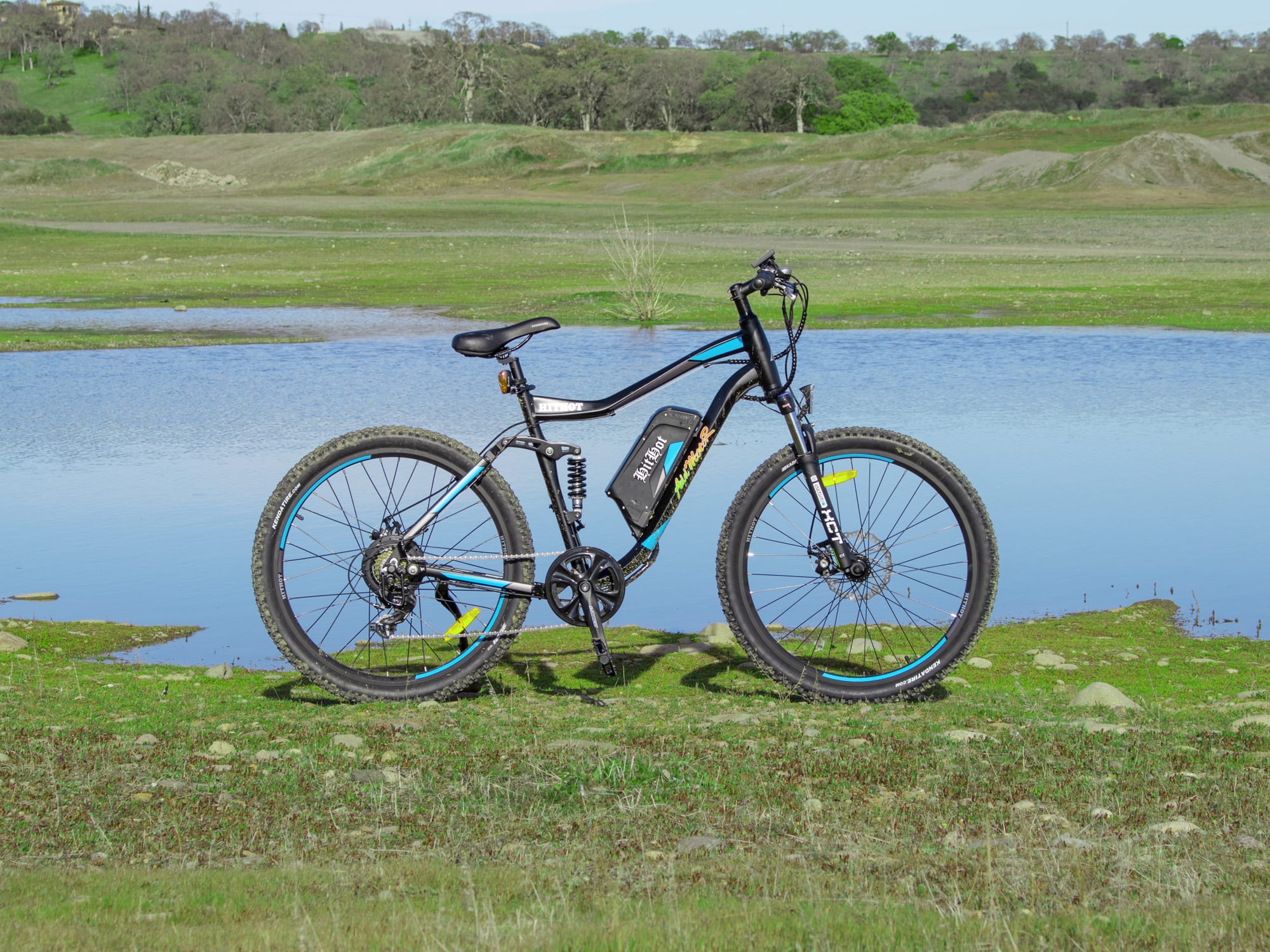

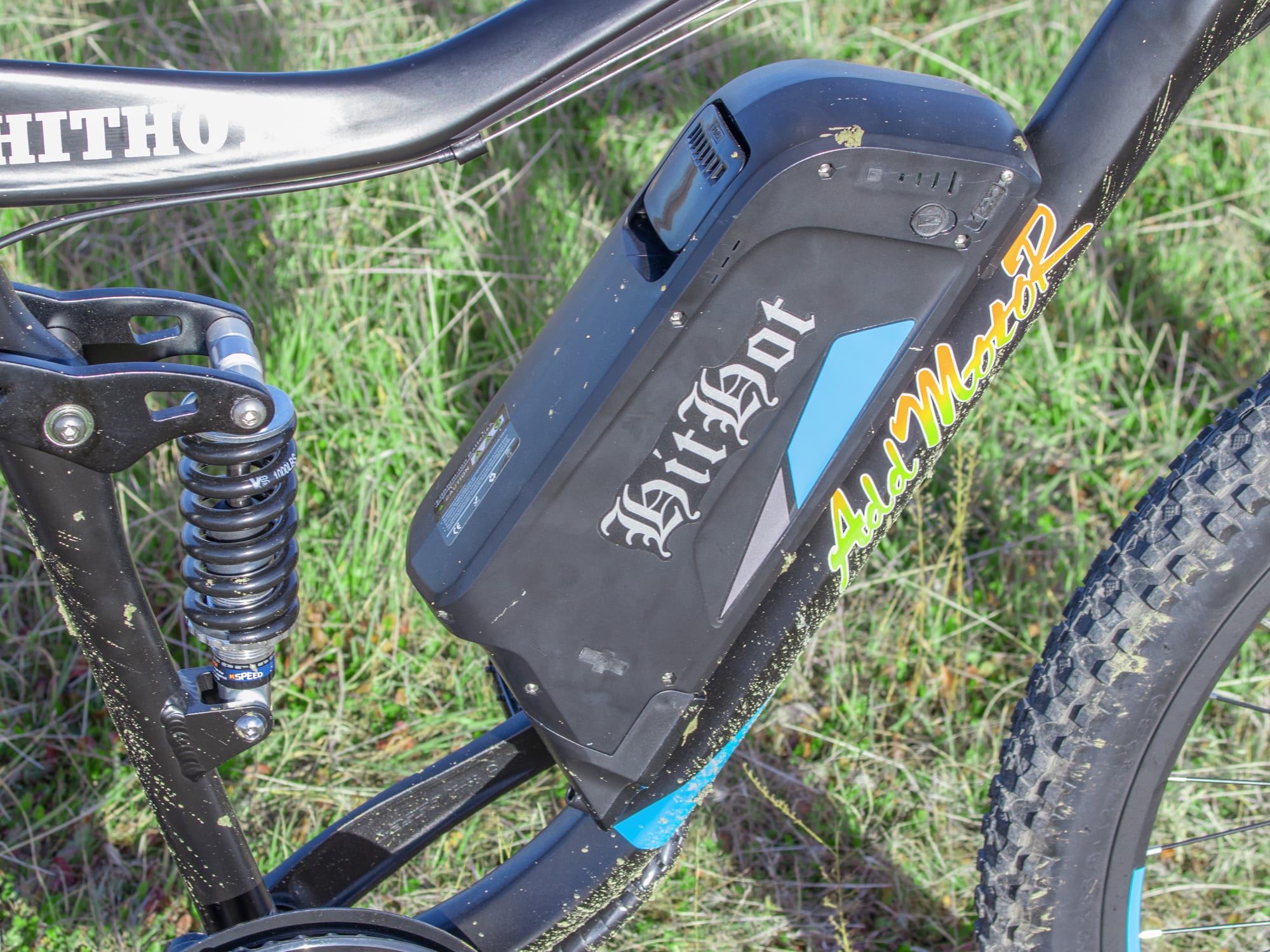
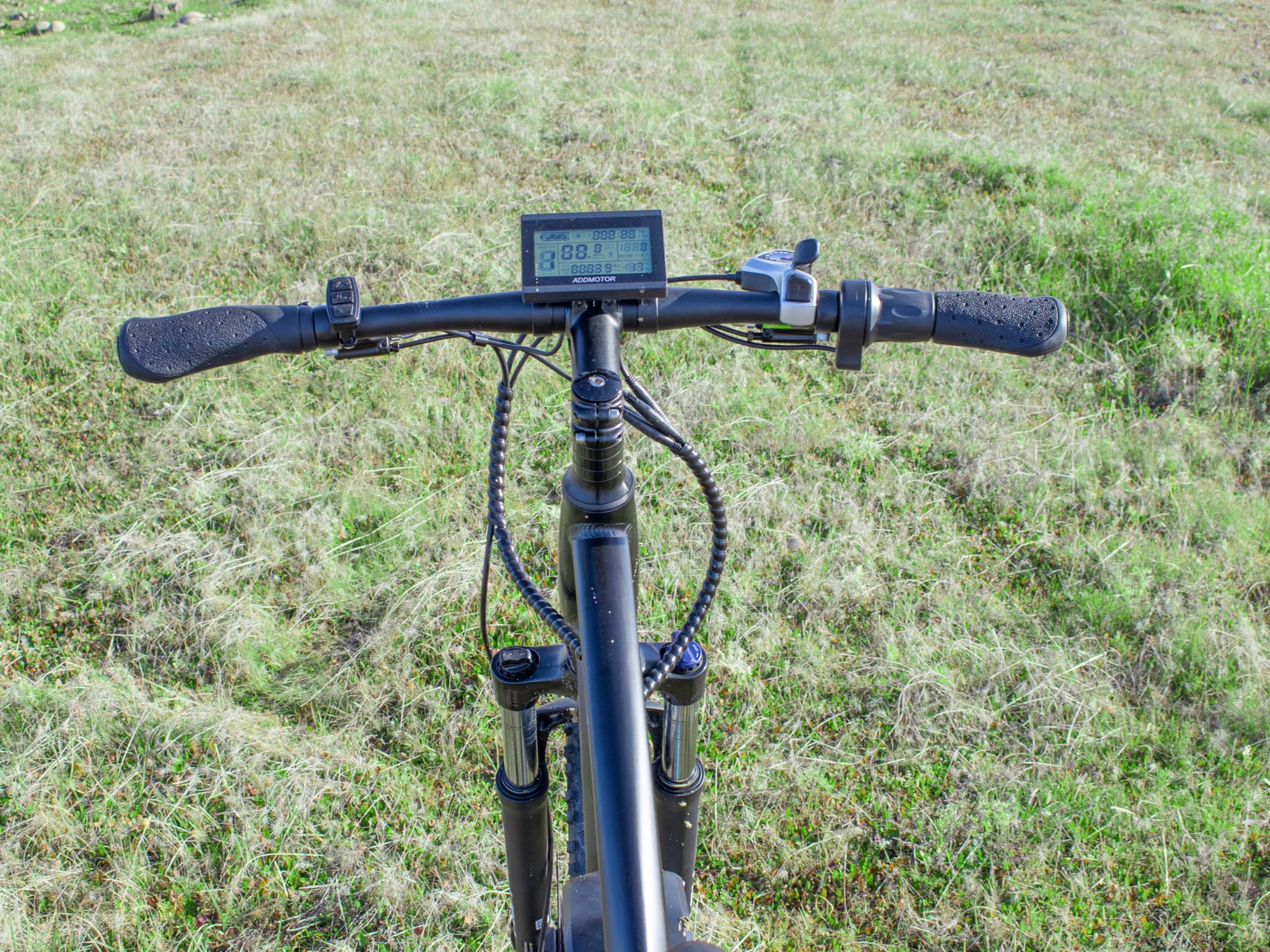
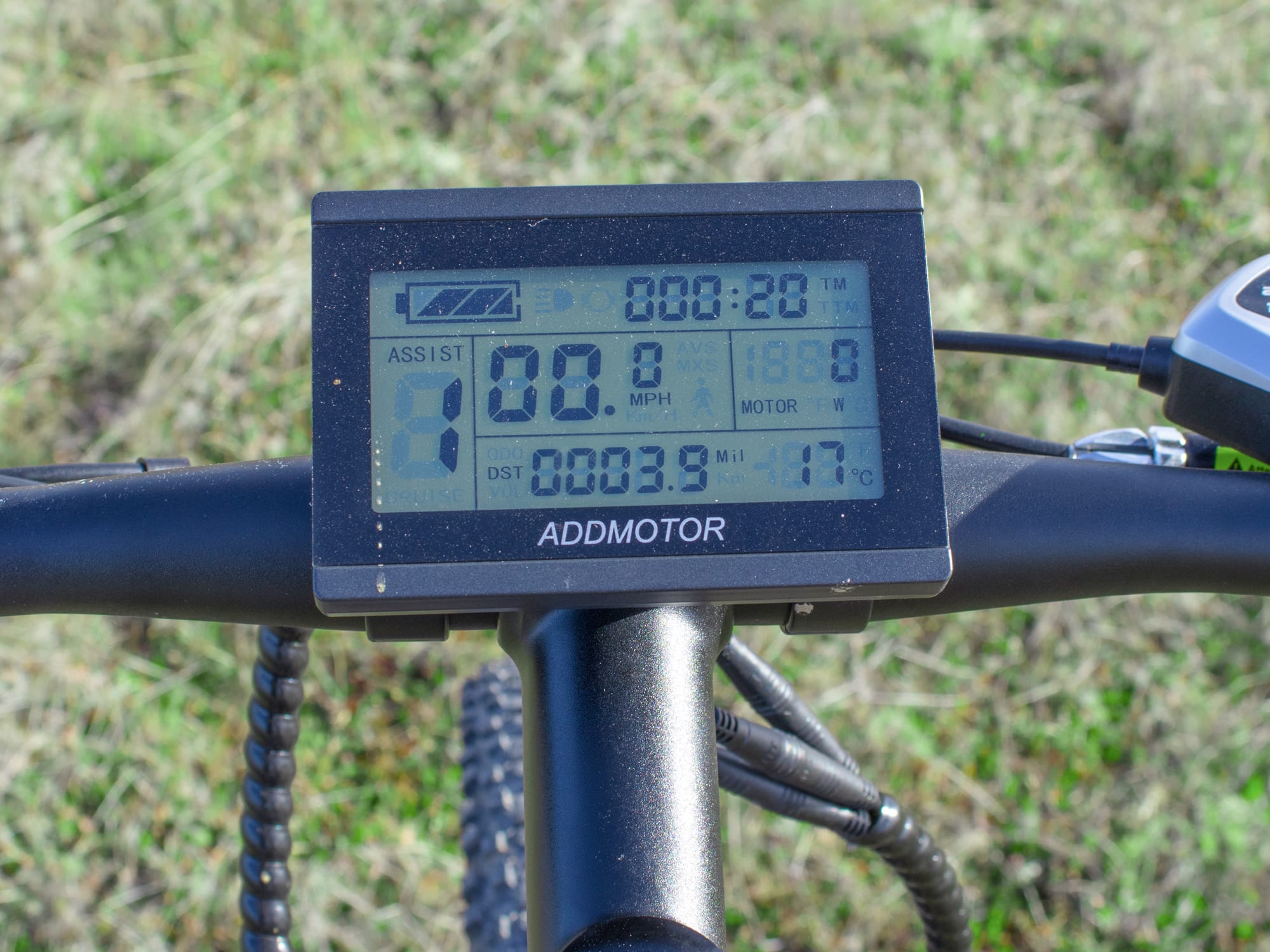


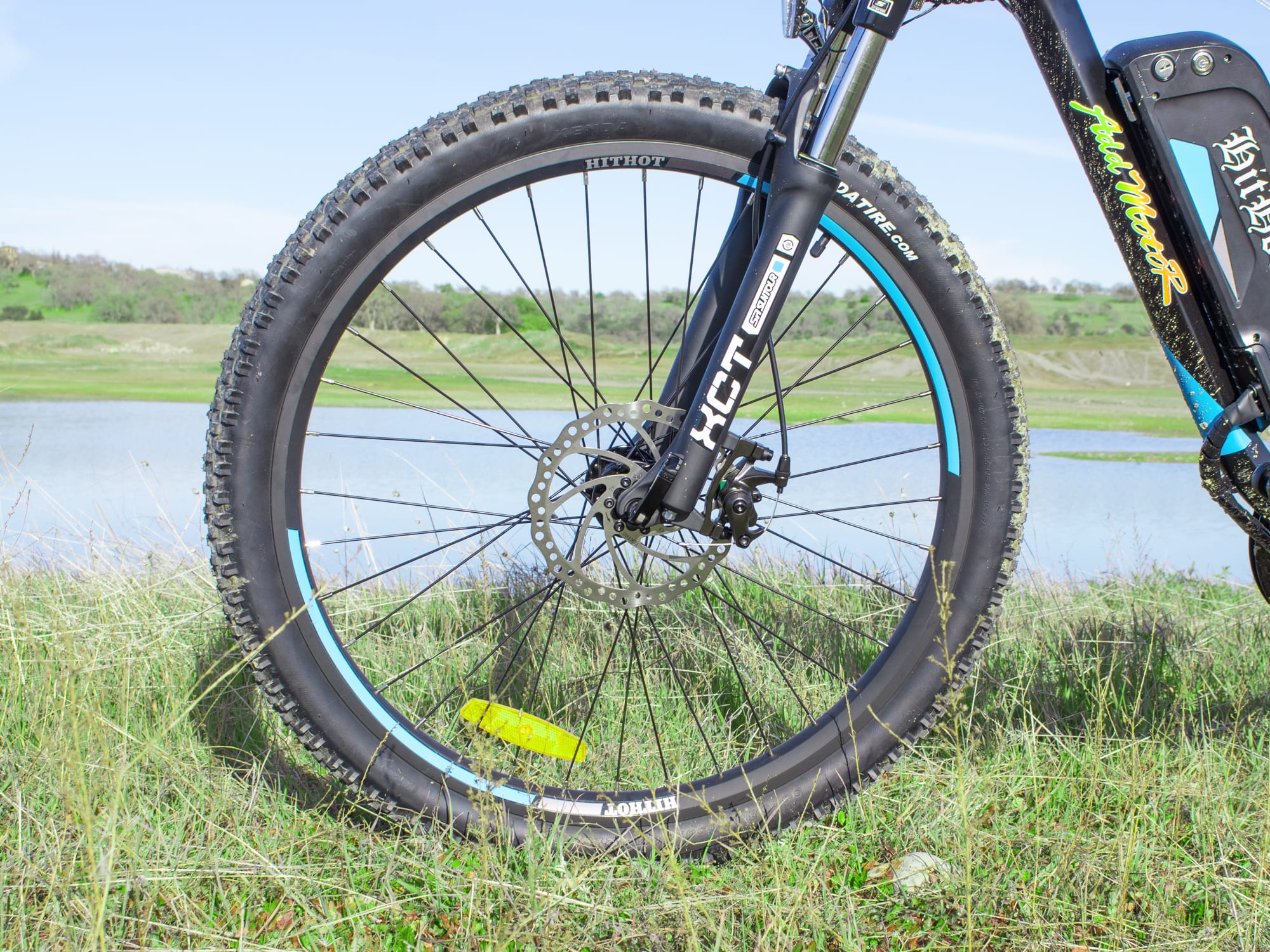
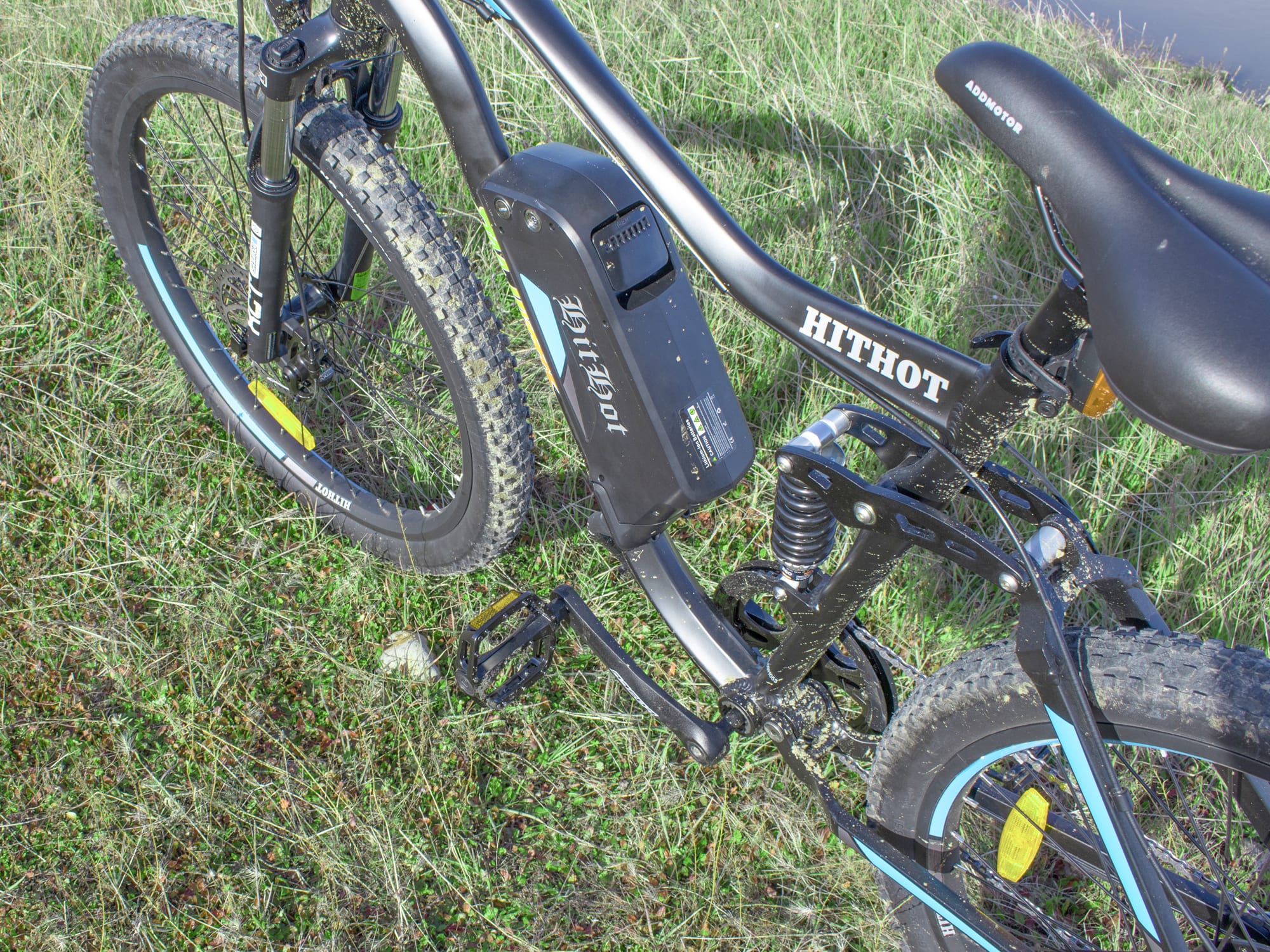
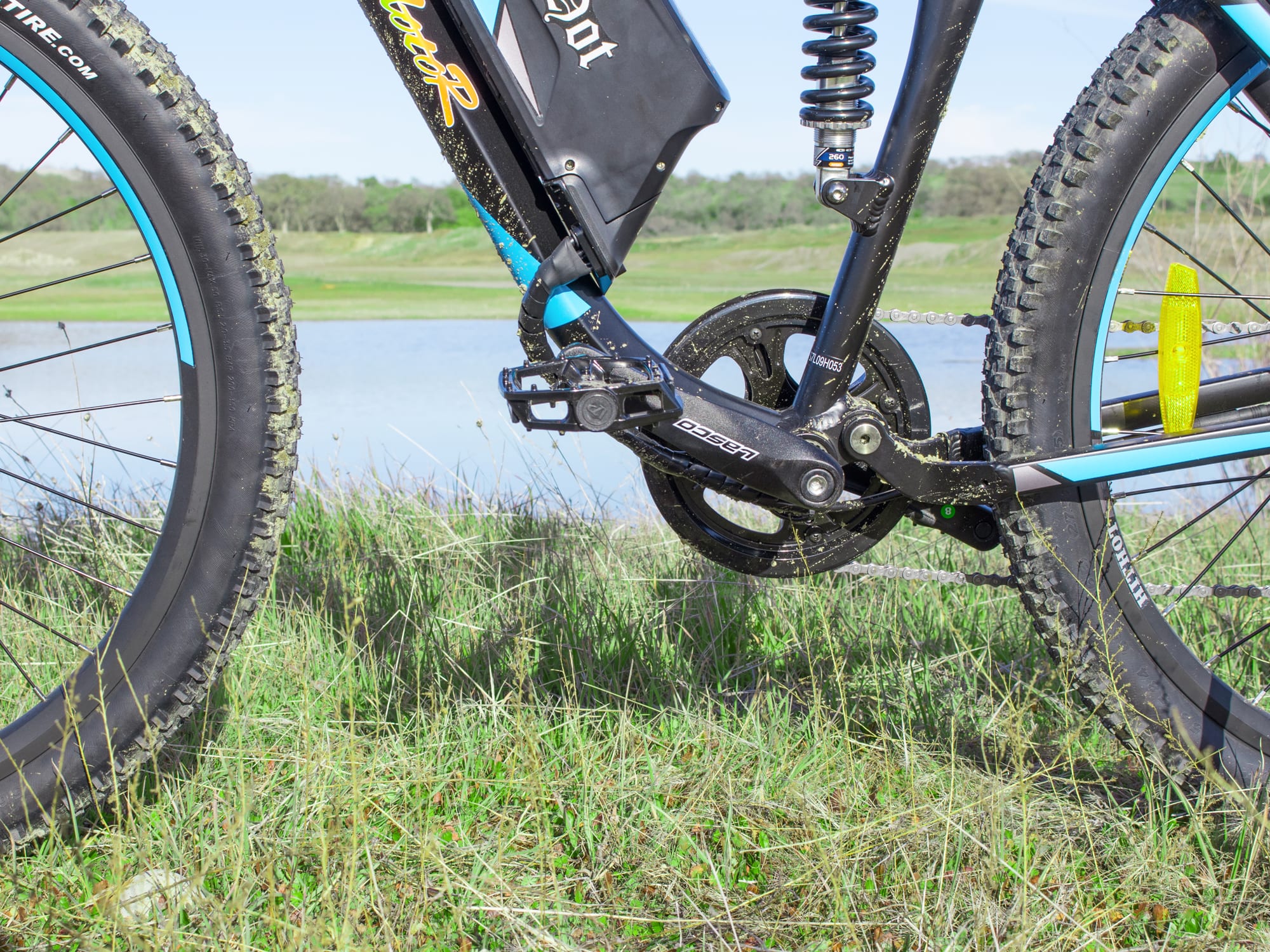
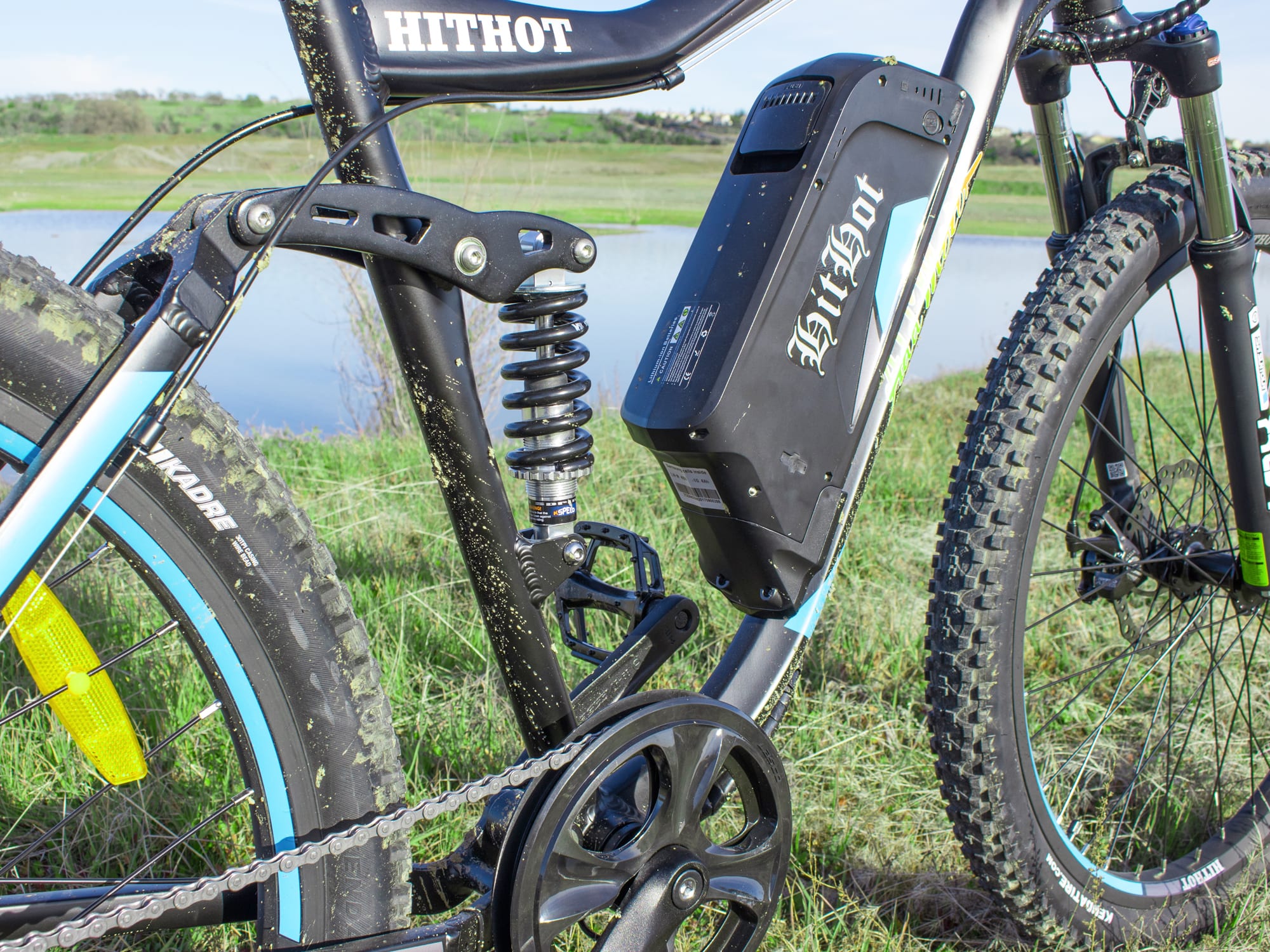
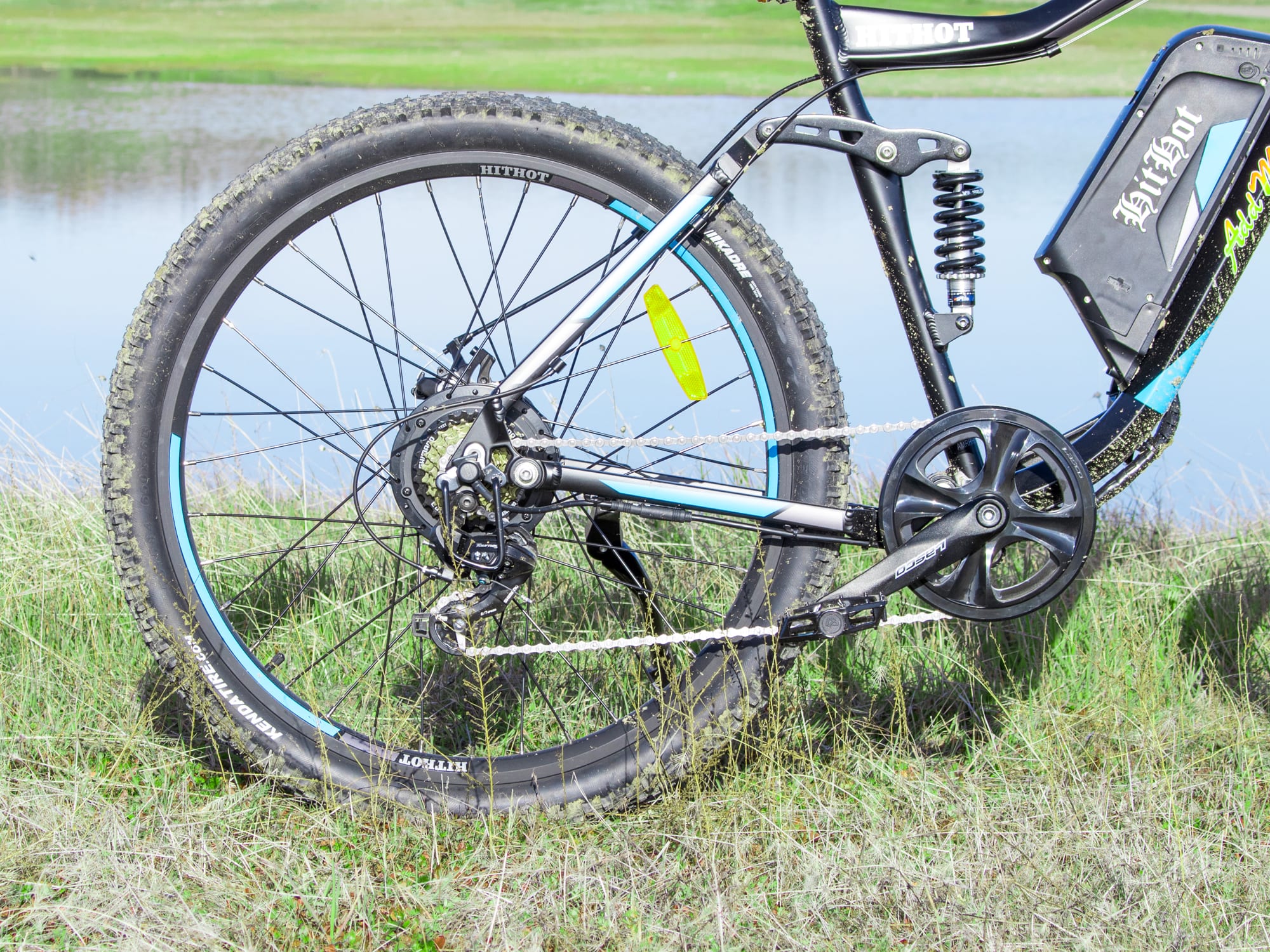
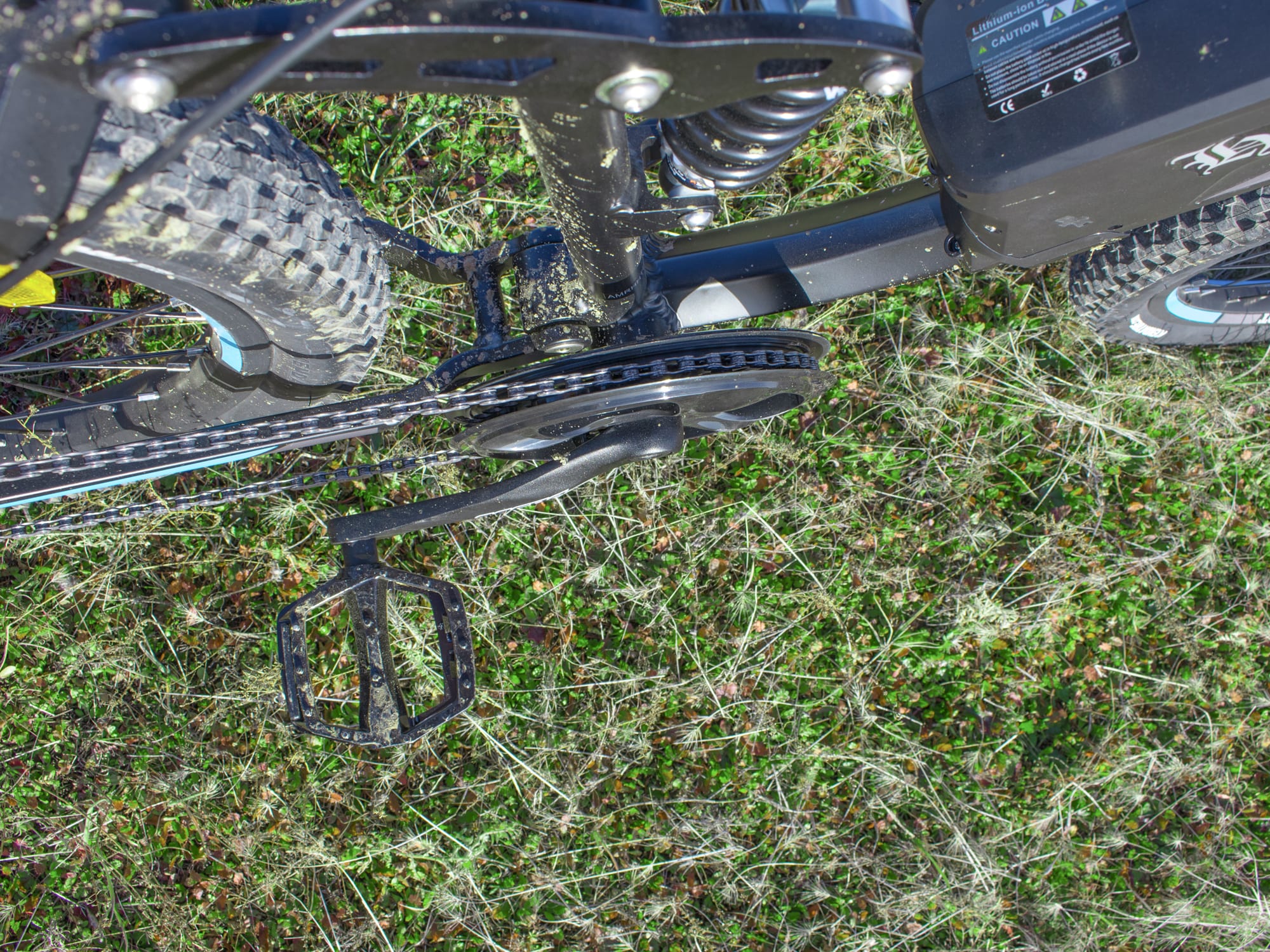
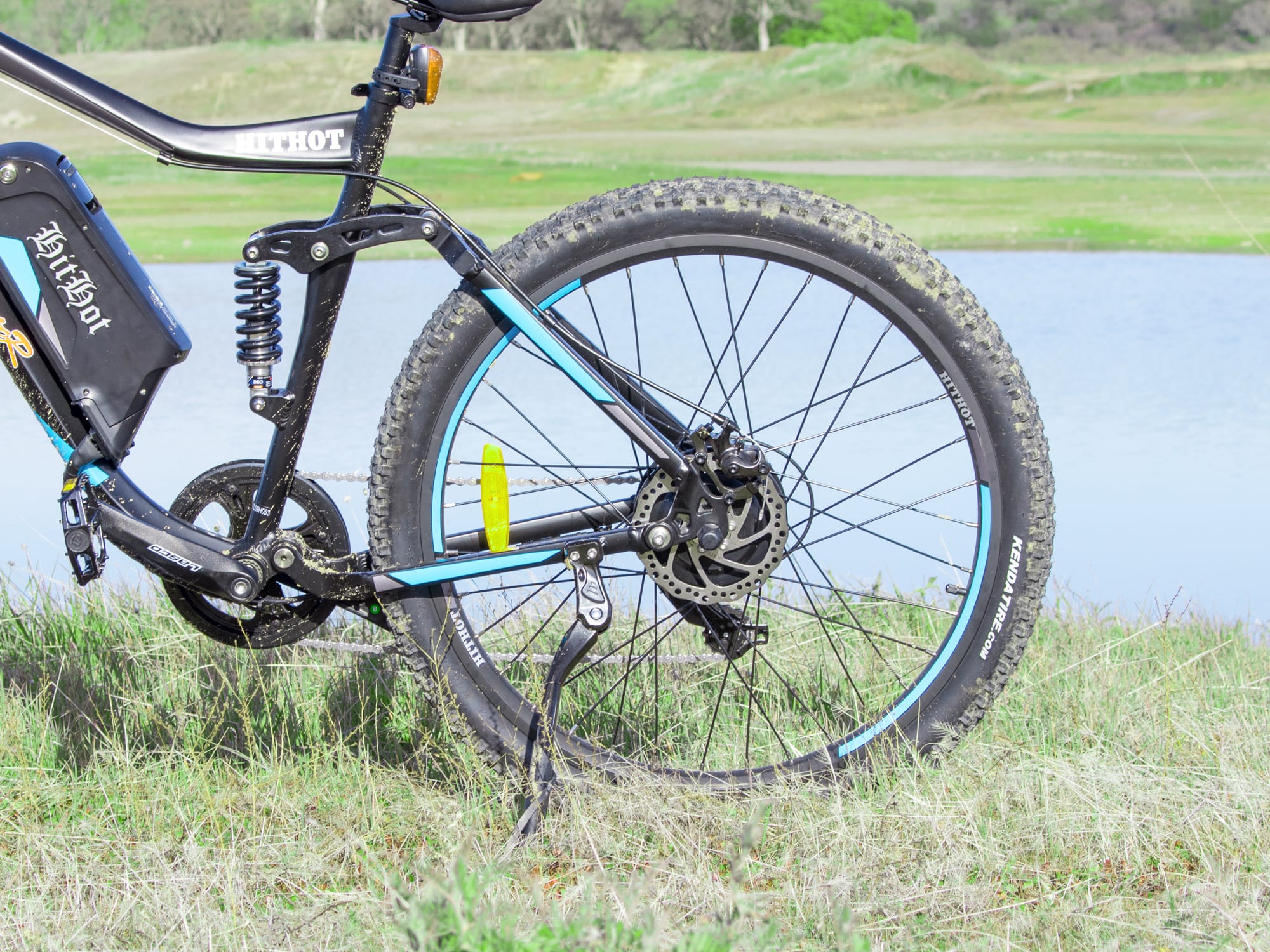
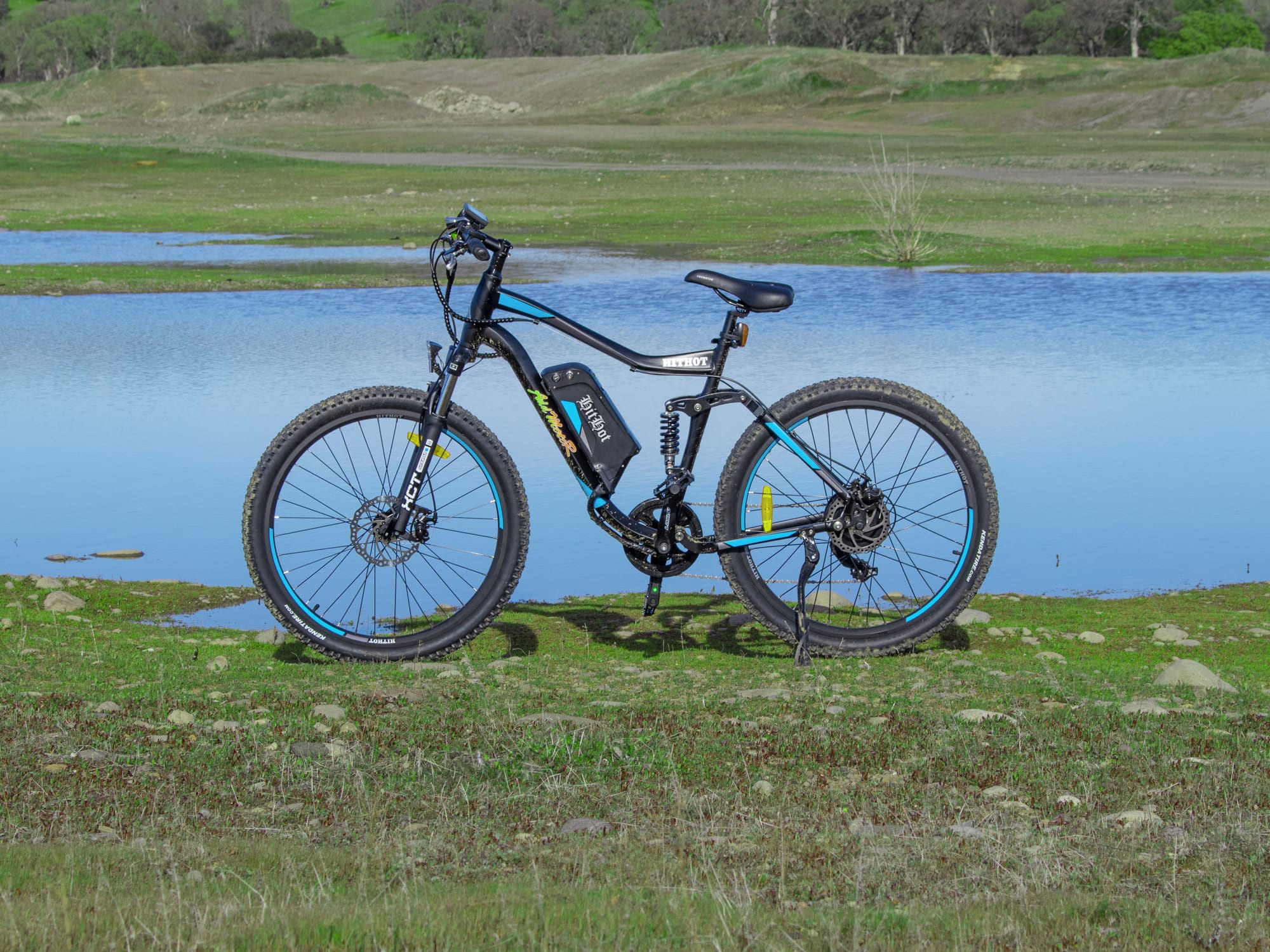
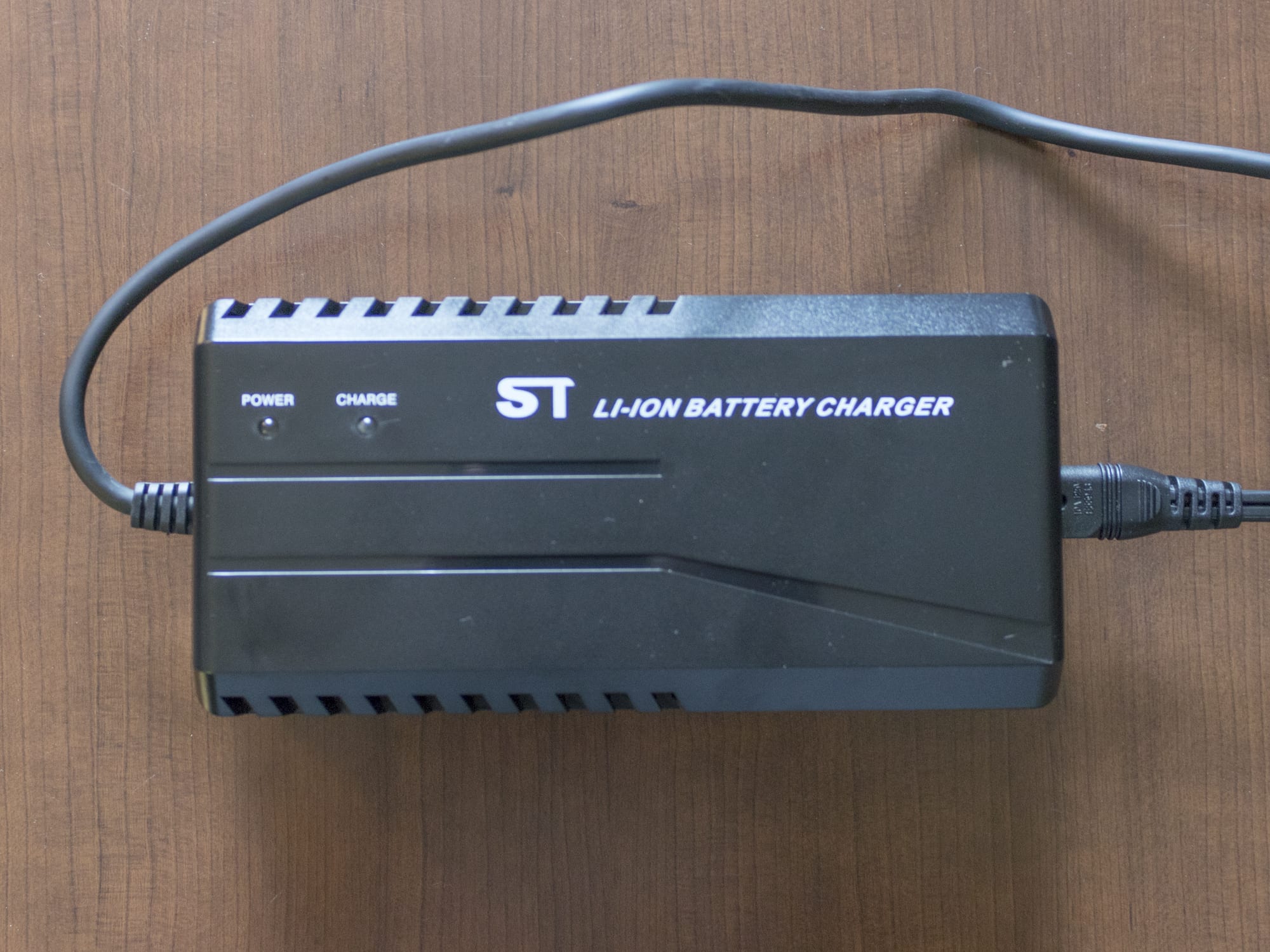
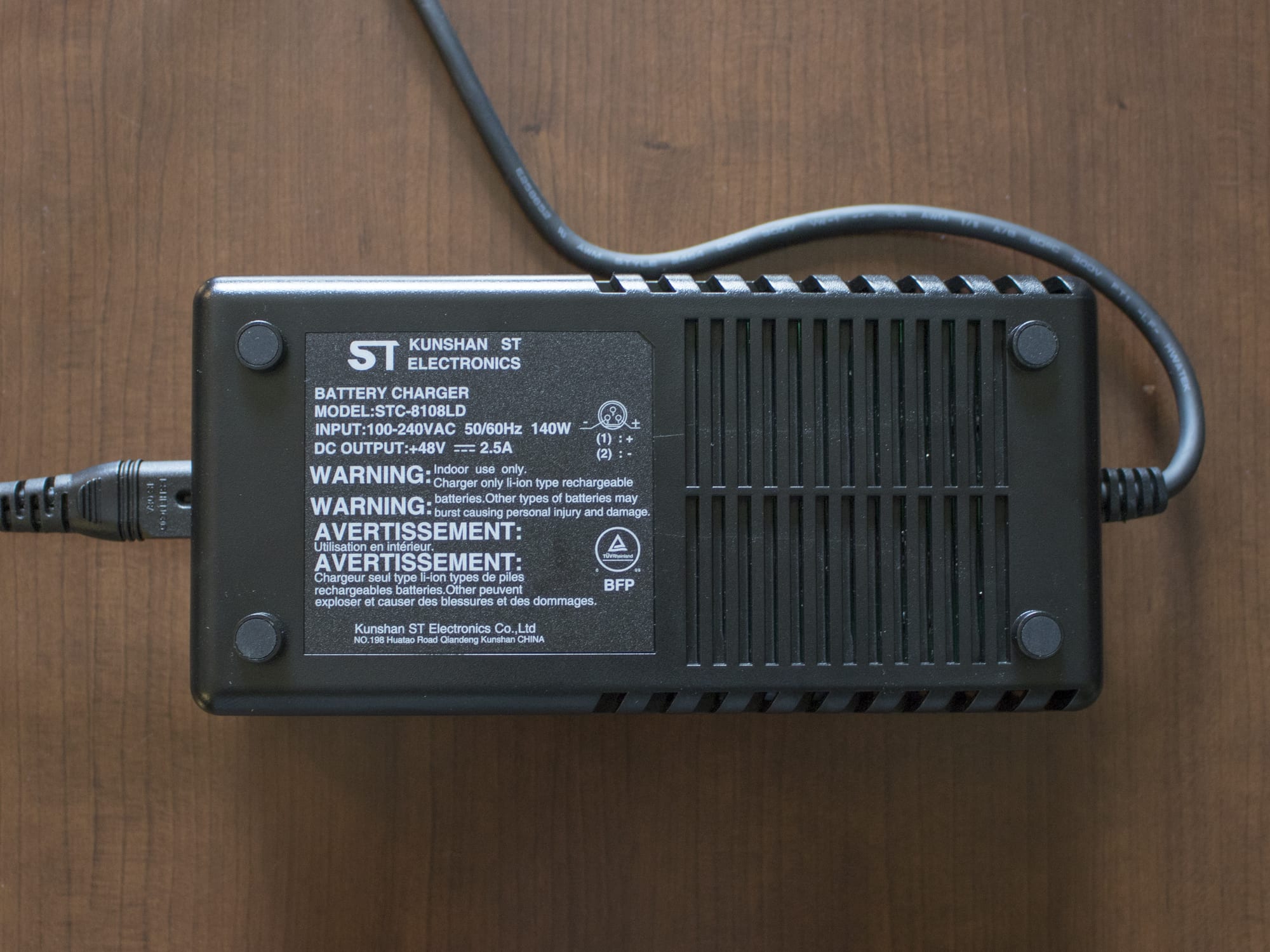



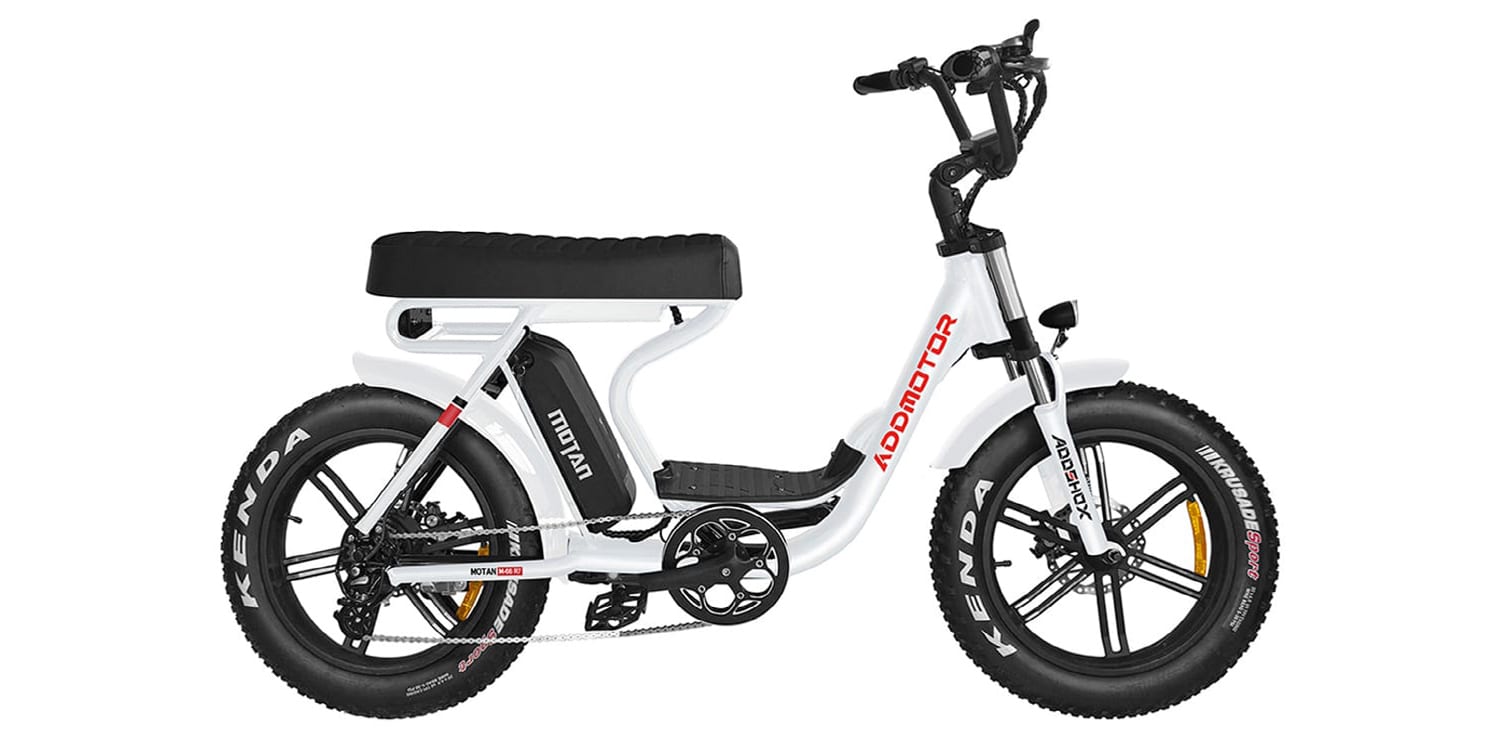
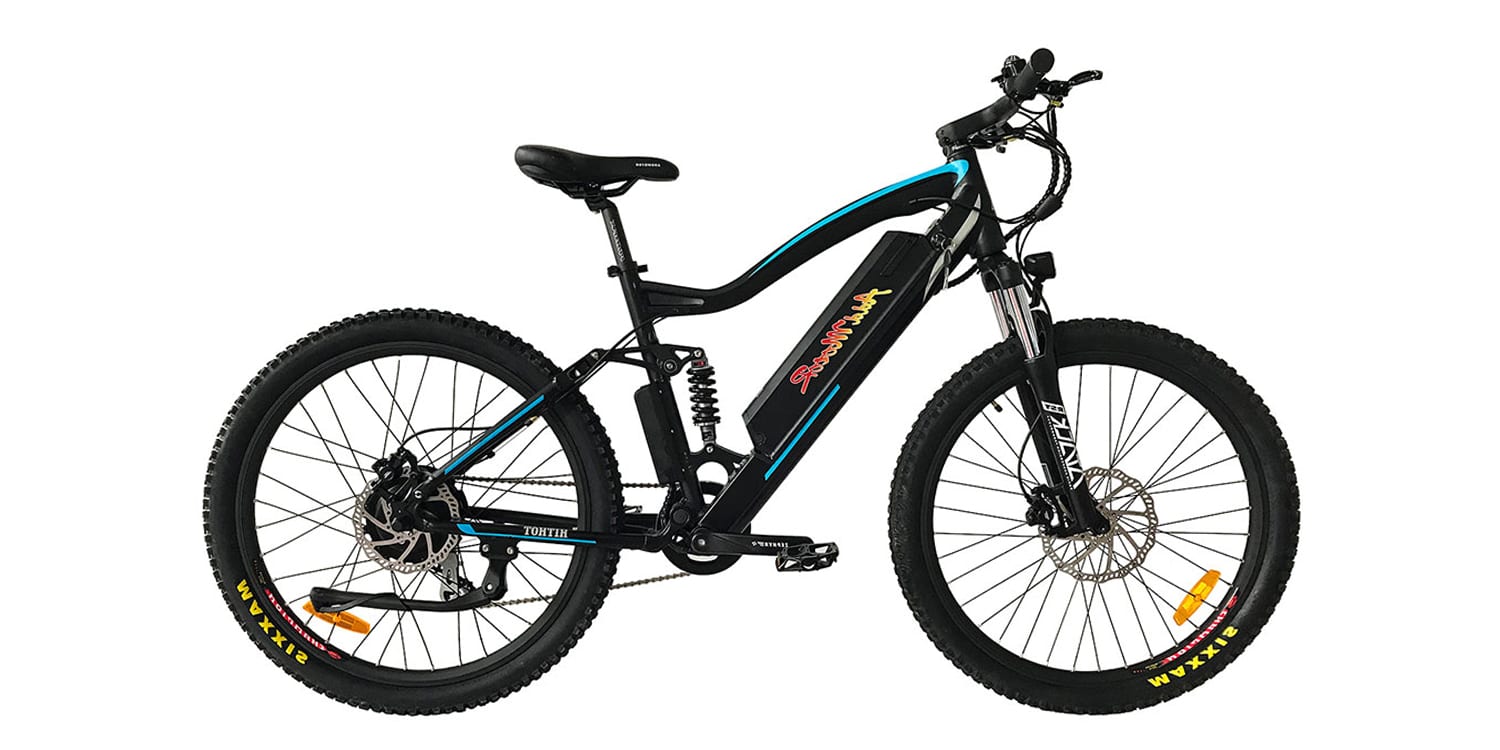
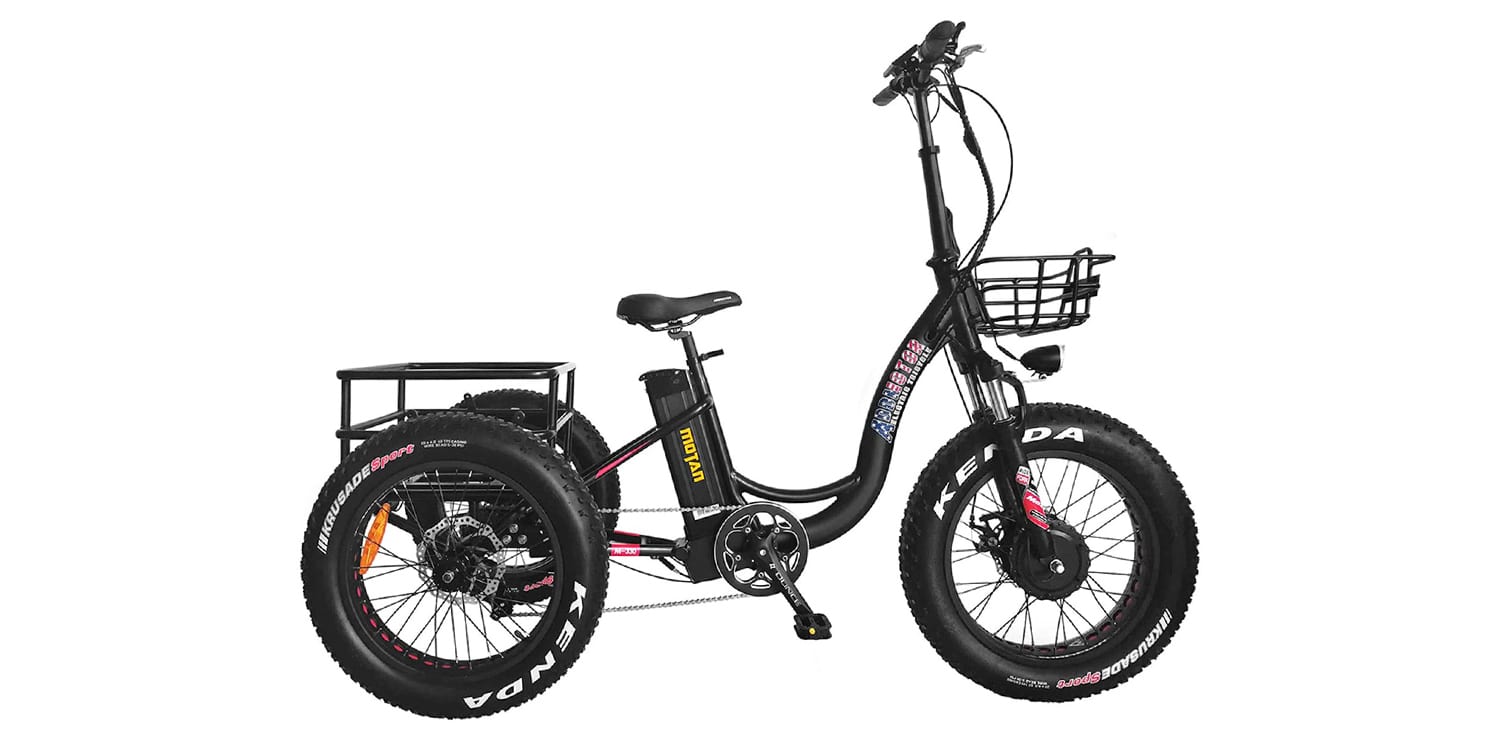
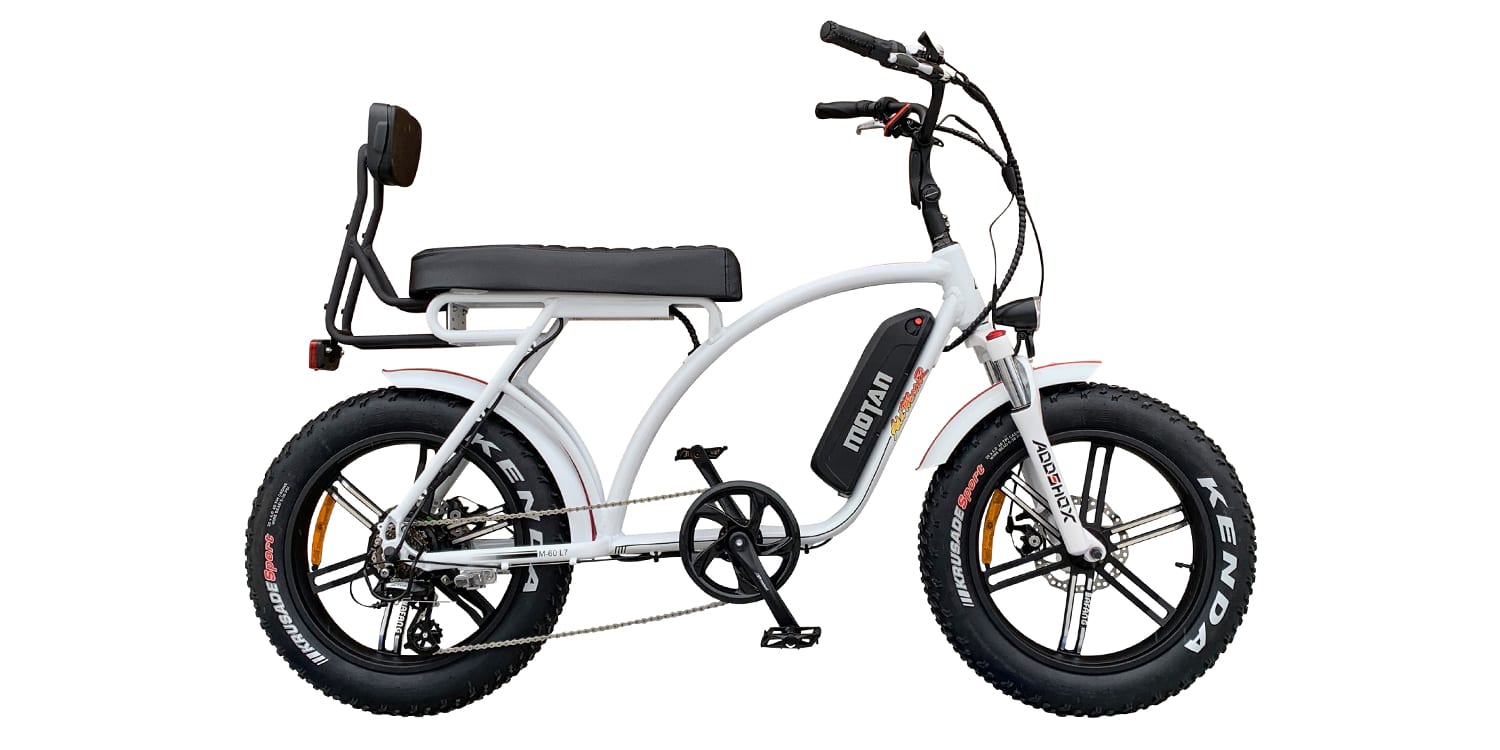
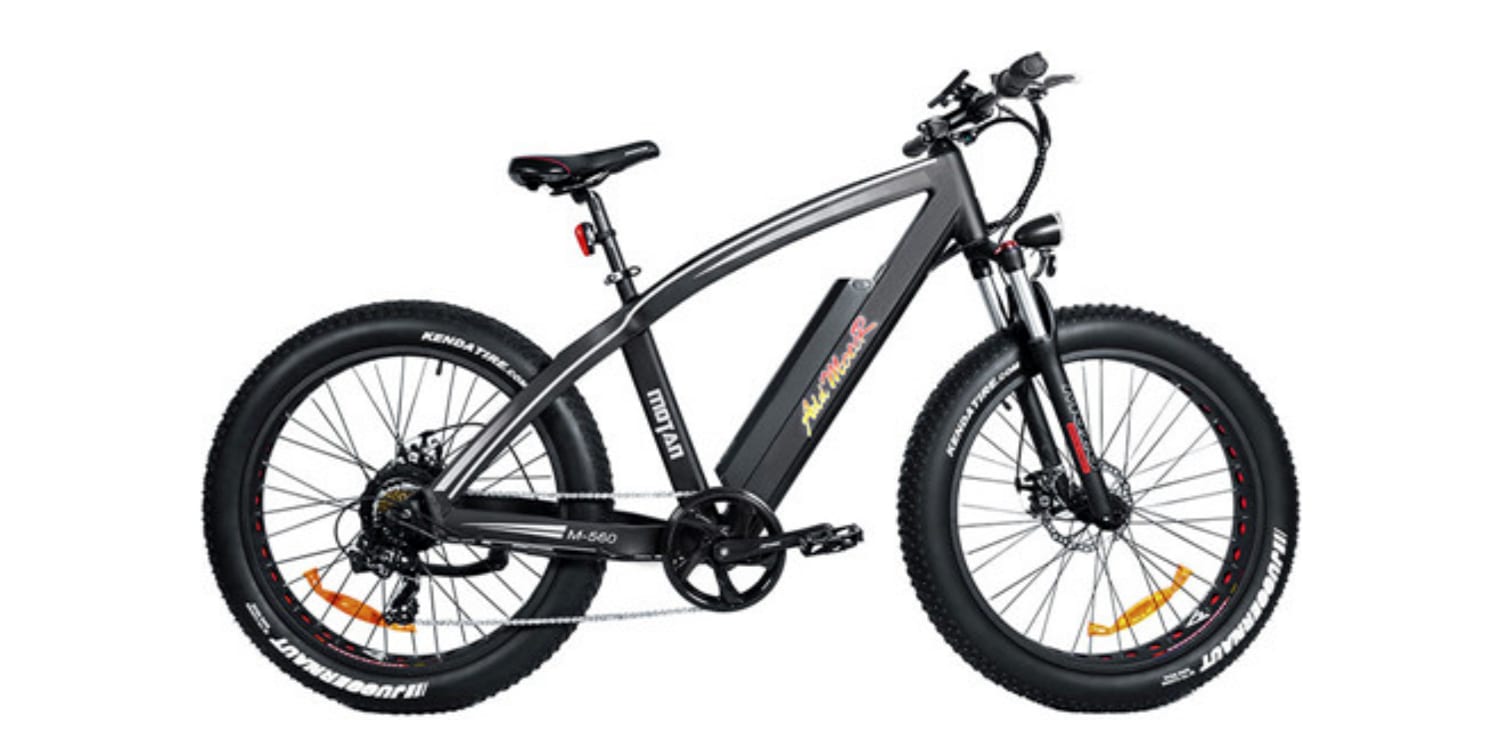
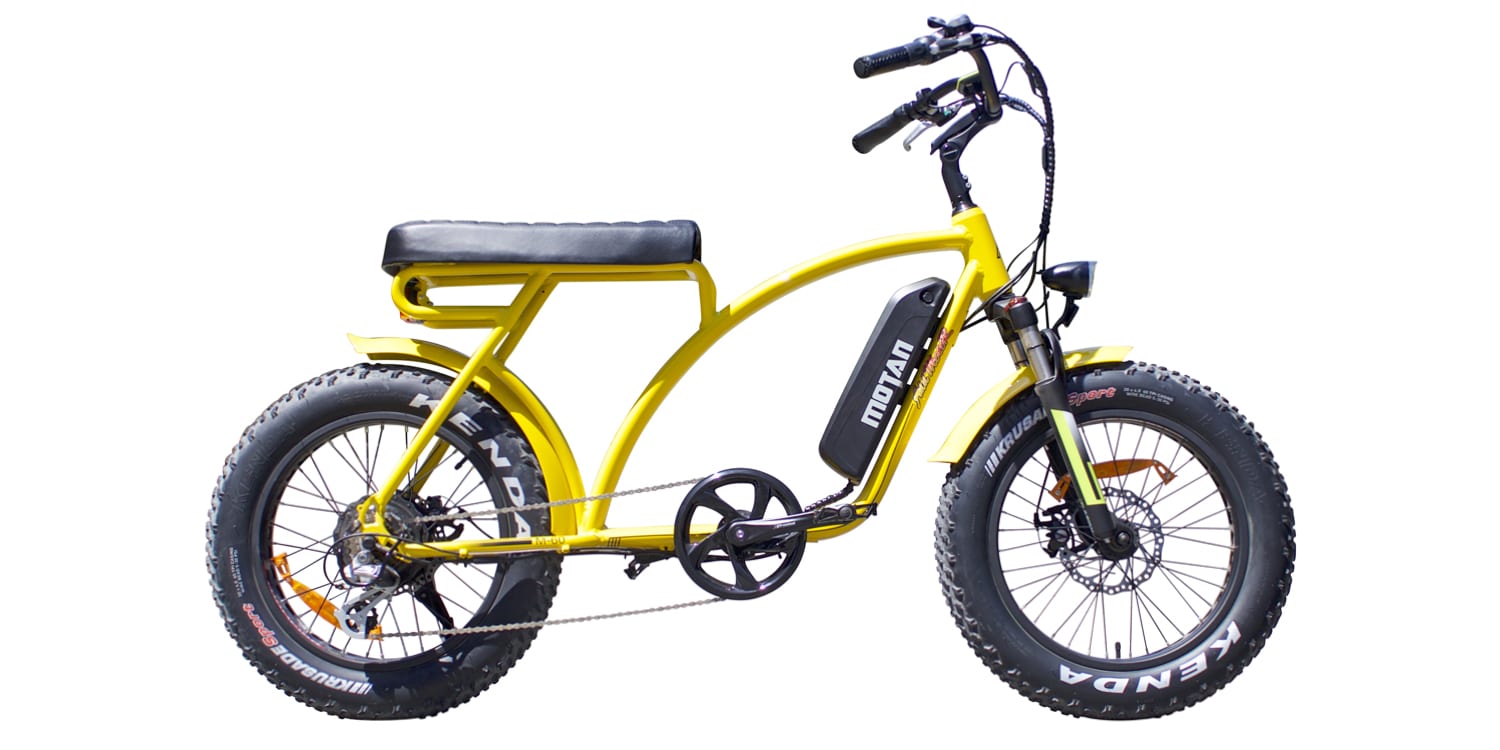
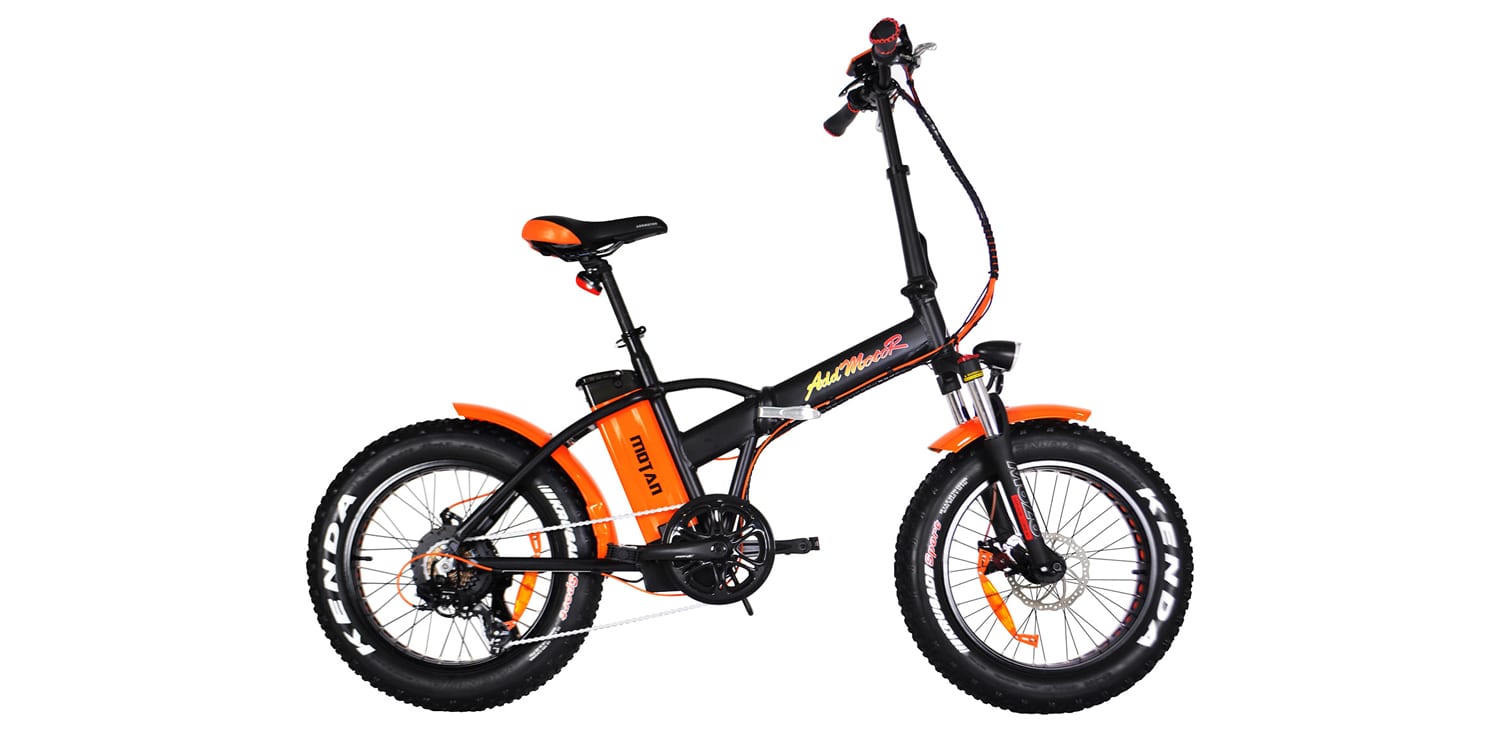
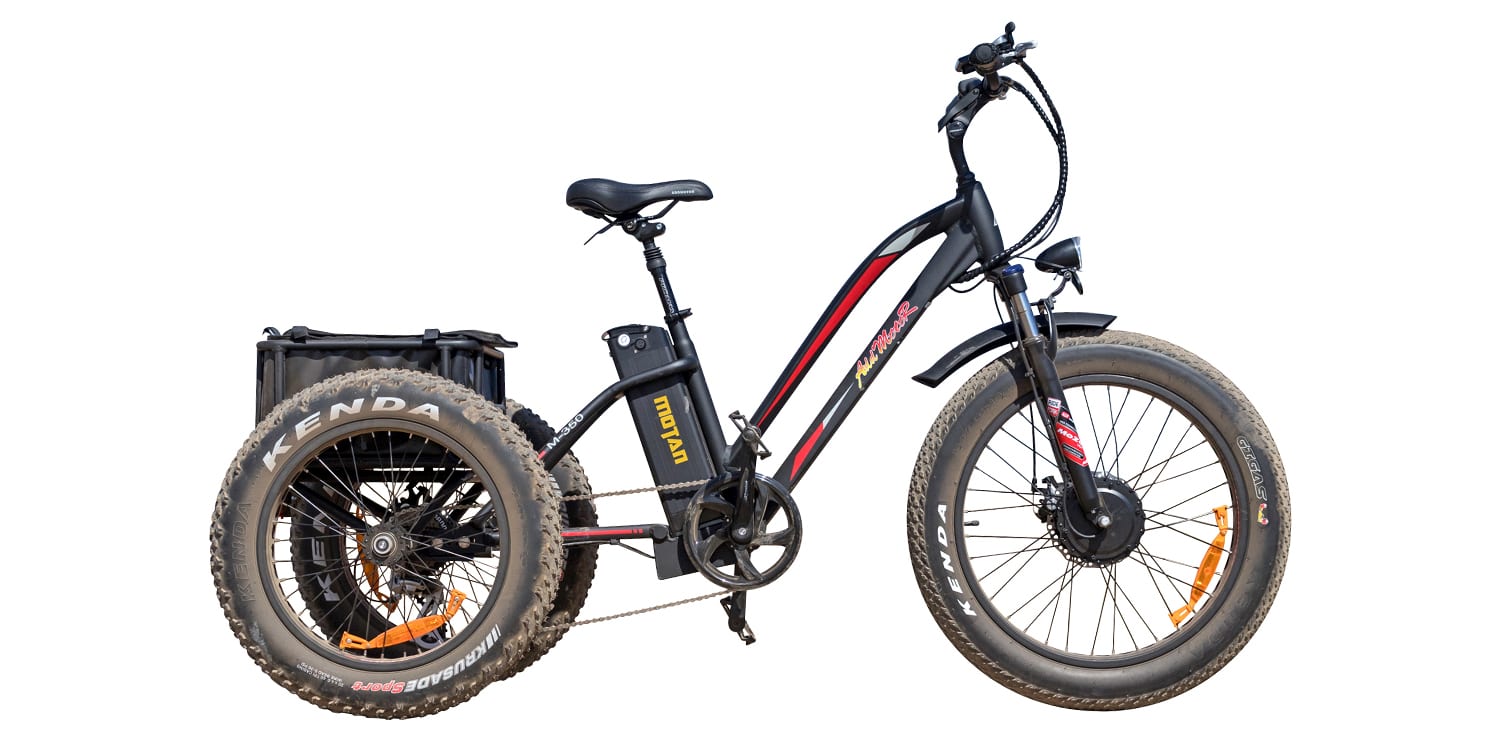
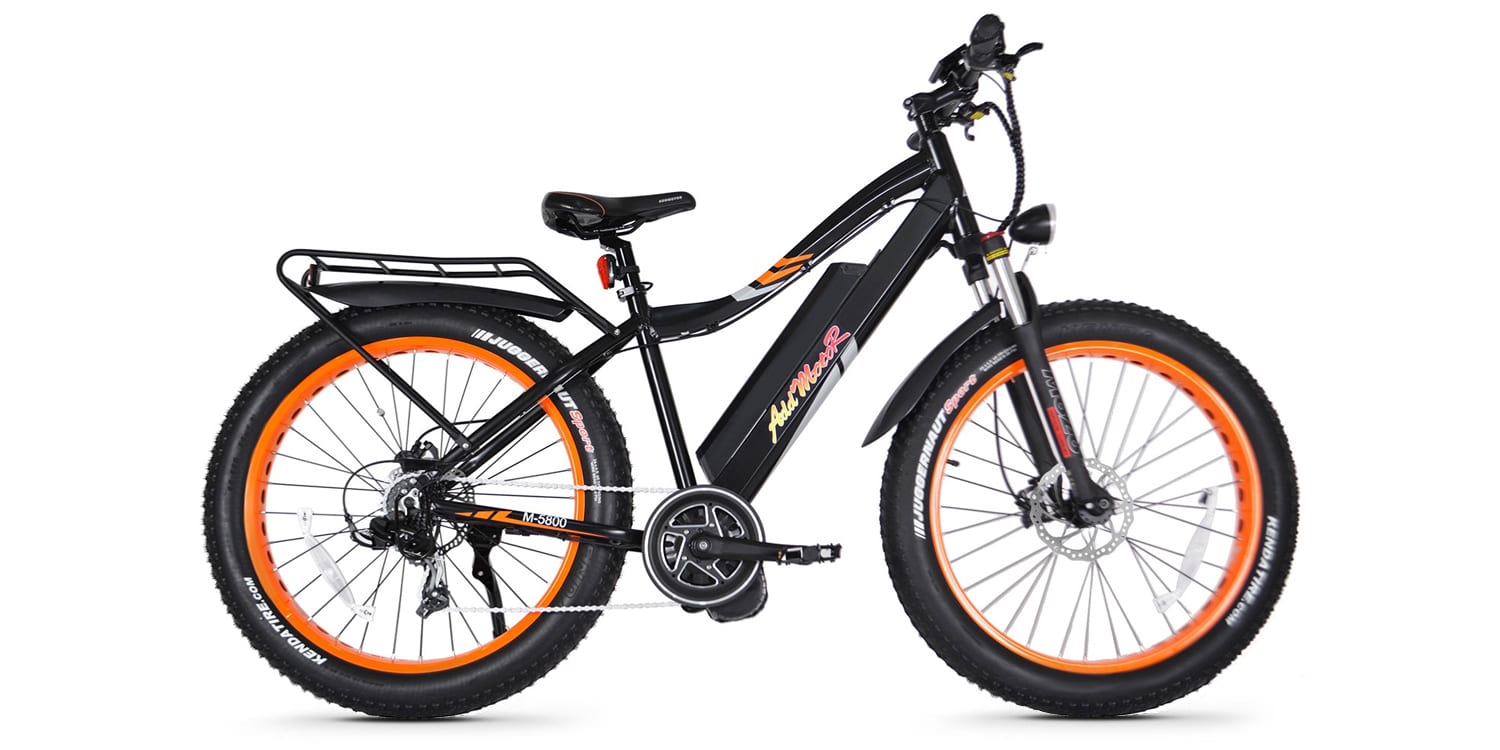

Mark says
“Rear suspension only has 22 mm of travel, which isn’t a lot (most forks offer 63 to 100 mm), but it still does an adequate job of absorbing shock and didn’t seem to add that much weight to the frame”
I am curious on how you measured that suspension travel. Is it measured by wheel travel or is it measured by the compression/extension of the coil over shock combo?
court says
Great question Mark, I asked Brent the same thing today but haven’t heard back… I wonder if he measured the spring distance vs. the travel of the rear swing arm. My guess is that the 22 mm is an imperfect approximation. It’s cool that he shows it in action during the ride test, maybe someone else will chime in. I don’t think this is something that AddMotoR provides much information on.
Update: Brent replied to me with the following statement “I measured the exposed metal piston and compared that to the specs I dug up online.” so I hope this helps guide you in terms of rear suspension travel and I welcome your input :)
Mark Peralta says
The shock rocker arm has approximately 2:1 ratio so the actual wheel travel will probably be double than that of the shock travel.
Ken says
Seems a lot of eBike companies are trying to hit these sub $2,000 price points but rarely do the components and configuration provide better value than higher priced options. I understand price points matter, but if someone is very serious about using an ebike as a car replacement on at any reasonable frequency then the ?value? of lower priced components that are less reliable and durable can result in a lower priced bike actually having a higher cost of ownership for say even the initial 3,000 miles (this is a rational estimate of how many miles someone should use an eBike for urban mobility if they are serious about a change in lifestyle).
If you know you are just going to be a weekend rider that cruises a few bikes paths on a weekend to have a picnic at the park, they buy the lowest price point bikes. Otherwise, give serious consideration to higher priced ebikes that will actually be a better value long term.
I would like to EBR add some kind of long term “cost of ownership” estimates to their reviews for say 2,500, 5,000, 10,000, 20,000 & 40,000 miles (maybe a good life cycle total for a good quality eBike or at least the life cycle of a really good battery).
court says
Hi Ken, I appreciate your feedback and agree that it can cost more to go with a cheap product sometimes (both in time and money over the life of ownership). I don’t love the idea of disposable products, but feel that we have reached some basic level of reliability and performance with even the less expensive bikes. It’s neat to see AddMotoR offering a wide range of ebikes and I hope that people who decide to buy some of them, will chime in here with feedback about the actual unpacking and long term experiences. It’s something I also care about, we’re doing our best here and your feedback is well received.
Ken says
Hi Court, Thanks for the follow-up. I do enjoy your reviews and the entire industry benefits from your efforts!
The potential of eBikes to help reduce urban congestion is significant so I tend to think that the purpose built bikes capable of replacing / supplementing as car need to set the quality bar pretty high. I know some electro-mechanical devices like printer have duty cycle ratings that attempt to indicate how suitable they are to application use. Maybe something like that for bikes would help people making purchase decisions. For example I could envision a Stromer being rated for 100+ miles a week continuously, but most of the low cost bikes may be really only designed / configured for 20 miles per week. I guess I’m just wondering if there is a way to rate the duty cycle of a bike so that potential buyers don’t over prioritize price point.
I’m the Ken that lives in Thornton CO…. hoping we can meet sometime whenever you are in Colorado. I’ll pay for lunch. :-) Take care and keep up the great work…. not sure how you do it….